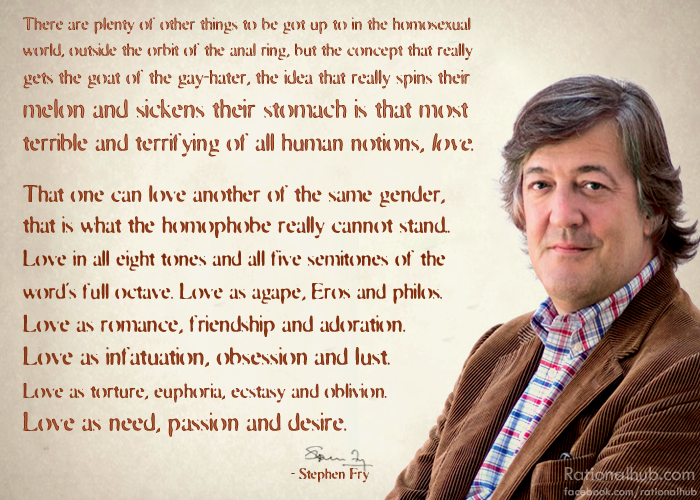
Homophobia and the Flawed Logic Behind It
When I have a down-to-earth discussion about homophobia with someone I respect, it’s often hard for them to identify why they dislike homosexuals.
This article is an attempt to walk step by step through the process it takes for me to get into the mind of a homophobe. Sometimes I can convert these people to my own views, but I try not to make that my goal. I’m much more likely to feel successful in the conversation if I simply learn the root of homophobia in the person I’m talking to.
The conversation will start broad, and then distill down into more direct questions about why any of us hold bias against anyone: misunderstanding each other.
Do you think it’s morally wrong to be a homosexual?
When I think of morality, the primary characteristic I look for is harm. When someone points at someone else and says that they are immoral or wrong, it’s hard for me to take their side if harm is not immediately obvious.

When someone tells me that a rapist or murderer are immoral, that’s an easy snap decision for me. The nature of their action is harming another human being. When someone tells me that marketing is immoral, I make that weird noise Obama makes when he’s trying to remember his next sentence (“ehhhhhh“). I can see why people consider it harmful, but I don’t think marketing as a whole industry is inherently immoral.
But when someone tells me that a personal lifestyle choice is immoral, it takes a bit of digging to figure out where the harm is. A friend or acquaintance of mine being a homosexual affects me less than their preference in beer. If they only like really fancy high-brow beer, we have fewer options on Friday night. If they only like to have romantic relationships with people of the same gender, it doesn’t change anything for me.
Of course I don’t run to the men’s bathroom with the other boys so we can chat about their date they brought. I don’t go to venues that have ‘ladies night’ or ‘gentlemen only’ on the door. When my wife and I go out on a double date with friends we rarely* play “let’s compare genitals”, which is good since I might feel left out if I was the only one with a penis. Our genders or orientations simply never matter in any public circumstance. I don’t believe that’s because we’re ‘straight’, I believe it’s because we don’t make it an issue.
*Kati wants me to point out that the word “rarely” above is definitely a joke.
One of my favorite bits that Doug Stanhope does is about how awesome gay people are. I can’t remember where or when I saw him do the bit I’m talking about, but the next paragraph was adapted from his bit.
I think we should encourage homosexuality! One of the biggest issues our world is facing today is our limited natural resources. The biggest gas-guzzler on the planet is a human baby, and the more of those we have, the less there is to go around for the rest of us. Gay people don’t make those. In fact, they actually go out of their way to pick up after the heterosexual people who make them and don’t want them. You want to reduce your carbon footprint? Try homosexuality!
Joking aside, what harm does homosexuality actually cause? I have yet to see any in my life, and I’ve surrounded myself with ‘the gays’ here in San Francisco and everywhere else I’ve lived.
Because Homosexuals [insert terrible action here]?
Do you hear people saying things like “How am I supposed to explain _____ to my children?” The statement doesn’t seem to be made as often now, thank [deity], but it was pretty popular when I was growing up to hear people saying that on daytime talk shows.
My answer to that question has always been “How are you supposed to explain war to your kids? What about starvation in first world countries? What about why some people are born with so much, and others with so little?”
http://lmgtfy.com/?q=how+do+I+explain+to+my+kids
There are hundreds of tough issues to explain to children.
This is not one of them.
If we actually phrase the question a child is likely to ask in a realistic way, the answer is one of the simplest and most understandable a child can hear.
Why are those two boys holding hands?
Because they love each other.”
Easy. The child isn’t asking how they make babies. They’re not asking for you to show them gay porn. They’re also not predisposed to thinking that homosexuality is wrong. That must be taught to them.
There are dozens of arguments that homophobes make against homosexuality. It takes less than 5 minutes of cursory research to discredit every single one I’ve heard so far. Just make sure you’re using non-religious websites and journals in your research and you can Google your way through nearly anyone’s arguments about homosexuality being immoral. In fact, many myths about homosexuality are debunked here in quickly digestible list format.
Let’s recap and breathe for a moment.
We’ve debunked several myths about homosexuals. We’ve shifted our perspective to seek harm before calling something immoral. We may not agree that harm is being done, but we can probably at least agree that the harm is either not very great or difficult to quantify. We’ve also likely found that no harm is being done directly to the person we’re speaking with.
People’s minds don’t turn on a dime. Biases like homophobia (or pro-gay biases even) can be stitched pretty deep into our views. Even people with anti-gay views hate being called ‘homophobic’ for a few reasons:
- ‘Homophobia’ is a term that implies that they’re afraid, and people don’t like being told that they’re afraid of anything.
- Just having a label placed on them implies that they are not normal.
Labels
#2 is the tough pill to swallow. As a hetero white male, I found it difficult to accept any label thrown at me. When the term ‘cis‘ started gaining popularity in social media, I initially scoffed at being labeled. It seems that only labels with positive or normative connotations were easy to accept when applied to me by others. Words like ‘straight’ were okay, but words like ‘vanilla’ were not.
I can apply negative labels to myself, but I immediately resist to labels that others apply to me. I used to hate the idea of being called a ‘stoner’ but I don’t anymore. I used to hate being called ‘stocky’ too. I embrace it now, but I prefer ‘stout’ because it sounds strong or like a beer I like. Anyone that feels they can label others, but others shouldn’t be allowed to label them has a fairly obvious struggle with hypocrisy on their hands.
So now that we’ve all been labeled by others in ways we disagree with, we can feel at least a bit more like we’re on even ground. We’re finally at that point where we’re ready to proceed to the next logical argument. Why are some people that understand all of these things still homophobic?
Because it’s gross?
When thinking about homosexuals, do you have a disgust reaction? Many people do, and we can hardly be held accountable for genuine involuntary reflexes. If someone talks about how great they think Tofurky is, I’d be hard-pressed to suppress my gag face.
But why do we react that way? My hypothesis is that our brains automatically try to imagine what it would be like for us to eat that Tofurky. The reason I make the gag face at it is because I’m imagining the flavor, texture and presentation of it as if it were served to me. I don’t like tofu very much, but I especially dislike tofu trying to be something else. This is based on my life experience, my conditioning, and (to a degree) the attitudes of people around me whose opinions I relate to.
So when I make my gag face at the thought of Tofurky, it’s not some natural instinct that a deity placed in my genetic code as an instinct. It’s not a ‘sin’ hard-wired into the human psyche. It’s a bias that I’ve developed; a learned behavior. Talk to vegetarians and you’ll sometimes come across people that make the same gag face when talking about cheeseburgers, a perfect medium rare steak, or bacon.

Do I dislike vegetarians? No. Their eating habits don’t stop me from enjoying my meat. They want my favorite restaurants to have at least a couple of vegetarian options on the menu, but they don’t want those options to replace my fried chicken. They just want to be able to go out to dinner with meat-eaters without feeling like an outcast or going hungry.
I don’t hold it against you that you’re not into your own gender. I’m not either. I don’t think it’s wrong for you to feel grossed out by things you don’t like. I just want to make sure you don’t try to take options off the menu for other people.
I’ve had to scroll my screen down beneath that GIF image I treated you with above. I can’t even handle seeing it out of the corner of my eye. Affection is gross. Not when I do it, of course. But when any of the rest of you are affectionate in public it’s gross. Sex is gross, regardless of the players involved. Life is gross. Humans and animals are all gross. Plants are probably gross too, but I have trouble relating to them.
What do we do when the unattractive couple we went to high school with has their third child? Do we imagine them having sex 9 months ago? I sometimes feel my brain wandering in that direction before I slap myself in the face and stop that image from loading. I’m fairly sure we all have to do that: curb our wandering minds to stay comfortable and sane. At least I hope I’m not the only one.
We don’t tell that couple to stop having kids because it grosses us out to think they had sex. That would make us assholes. We don’t tell that vegan soul food restaurant downtown to shut down because the smell makes us imagine eating that food that we might find displeasing. We don’t force a woman to wear clothing that covers everything but her eyes because her appearance makes men feel lustful. We don’t encroach on other people’s entire lives simply because it affects our mood in some minor way for 2 minutes of our day.
Do we?

Some Final Notes : Homophobia and Choice
You may have noticed that I didn’t talk about religion here. I’m not going to talk about how to fight against a person’s religious choice here. That’s an entirely different route for this conversation that is easily derailed into other topics.
This article is intended as a discussion about subjective morality and self-discovery. A hypothetical conversation between me and someone I respect with a different point of view than my own. We should all take pains to have these discussions, no matter which side we’re on. Not to change each other, but to learn about each other and ourselves. Society is woven by the sharing of differing minds and love is built on a foundation of vulnerability and trust. It is human to interact this way.
No matter where you stand on the topic, it’s a choice. We can rationalize our choice any way we like. We were all taught garbage growing up that we had to unlearn as we got older. We don’t have to hold on to notions like how great Christopher Columbus was or the cherry tree George Washington chopped down as a child. We don’t have to hold on to the notion that different is wrong, just because perhaps it was the first option we learned. The choice is ours.
